
The Undergraduate Student Research Program gives outstanding University undergraduate students the opportunity to conduct research under the direction of an ARD faculty mentor. It is open to junior and senior undergraduates proposing to work with a faculty member who has an ARD appointment.
ARD provides up to $2,500 per successful student applicants, with a required 100% match by the participating units and/or ARD faculty mentor. Awardees are selected by ARD based on the quality of the submitted proposal.
2021 Recipients
Callie McCright
Faculty Mentor: Dr. Steven Comfort
A Biological and Chemical Approach to Restoring Water Quality in Eutrophic Bodies of Water
One of the most pressing issues affecting freshwater ecosystems and drinking water is pollution caused by agricultural and residential runoff. Excess nutrients, like nitrate and phosphorus, cause harmful algal blooms. Callie’s research project aims to mitigate nutrient content in freshwater bodies of water.
Her project involves both a chemical and biological treatment approach. The biological approach utilizes floating treatment wetlands. The submerged roots of the plants uptake nitrogen from the water, while microbes on the plant roots convert nitrate to nitrogen gas. The chemical approach utilizes lanthanum, a soft metal. Lanthanum binds to phosphates in the water, making phosphorus unusable by algae. The combined effects of these treatments have the potential to reduce eutrophication in fresh bodies of water.
Ashley McMurchie
Faculty Mentor: Dr. Matthew Andrews
Adapting Hibernation to Rat Cardiac Ischemia to Solve Donor Organ Shortage
Understanding and adapting the conditions of natural hibernation in mammals to human physiology could be the key to solving one of the greatest issues in medicine today: the donated organ shelf life. This experiment explores the technique of injecting a pre-conditioning, or hibernation, solution into the donor to circulate through the body and induce organs to enter a metabolic state that can withstand minimal blood flow and low temperatures. Ground squirrel and rat hearts will be studied on an in-vitro apparatus, to assess the effects of the pre-conditioning solution on the heart’s ability to beat outside the body cavity, indicating the organ’s function and viability. This method could allow for the lengthening of donation organ shelf life by slowing cellular death to make organ banks possible.
More details at: https://ard.unl.edu/ianr-ard-undergraduate-student-research-program